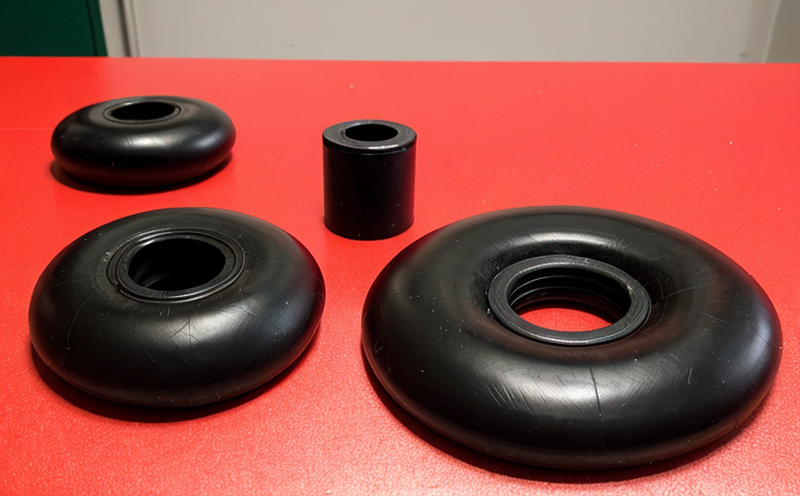ASTM D412 Tensile Testing of Rubber and Elastomers
The ASTM D412 test method is a fundamental standard used to measure the tensile properties of rubber and elastomers. This testing procedure provides critical insights into the mechanical behavior of these materials under stress, which are crucial for quality control, product development, and compliance with industry standards.
During ASTM D412 testing, specimens of rubber or elastomer samples are subjected to gradually increasing tensile loads until they fracture. The test measures several key parameters including tensile strength, elongation at break, modulus of elasticity, and fracture energy. These metrics are essential for understanding the performance characteristics of materials used in various applications such as automotive components, footwear, and medical devices.
Specimen preparation is a critical step that significantly influences test results. Proper sample cutting and conditioning ensure accurate and reproducible outcomes. The specimens should be cut to standard dimensions specified by ASTM D412, typically 50 mm wide and 250 mm long, with rounded ends. After cutting, the samples are conditioned at room temperature for a minimum of four hours before testing.
The testing apparatus used in ASTM D412 is a tensile tester capable of applying controlled loads to the specimen. The machine must have precise control over the rate of loading and displacement to ensure accurate measurements. High-precision load cells are required to measure forces accurately, while extensometers may be used for more detailed strain measurements.
The test procedure involves mounting the prepared specimens onto the tensile tester jaws and applying a controlled load at a specified crosshead speed. The machine records the force and displacement data as the specimen stretches until it breaks. From this data, engineers can calculate the tensile strength (the maximum stress experienced by the material before failure) and elongation at break (the percentage stretch of the sample before fracture).
The results from ASTM D412 testing are critical for ensuring product quality and safety. For instance, in automotive applications, accurate tensile data helps ensure that rubber seals and gaskets can withstand mechanical stress without failure under operational conditions. In footwear manufacturing, these tests help verify the durability of soles and uppers. In medical devices, compliance with ASTM D412 ensures that elastomeric components are robust enough to function safely in critical applications.
By adhering to ASTM standards like D412, manufacturers can ensure consistent product quality across batches, regions, and suppliers. This is particularly important for industries where the mechanical integrity of rubber and elastomers directly impacts safety and performance. Regular testing helps identify potential weaknesses early in the development process, allowing for necessary adjustments before full-scale production.
In addition to ensuring compliance with regulatory requirements, ASTM D412 testing also supports continuous improvement initiatives. By regularly measuring tensile properties, manufacturers can monitor changes in material quality or manufacturing processes over time. This data-driven approach enables proactive problem-solving and innovation, leading to safer, more reliable products.
Applied Standards
The ASTM D412 test method is one of several standards used in the rubber and elastomers industry. It is specifically designed for vulcanized or cured rubbers and synthetic elastomers, making it applicable to a wide range of materials including natural rubber, styrene-butadiene rubber (SBR), polyisoprene, and more.
ASTM D412 complements other testing methods such as ASTM D573 for compression set, ASTM D624 for tensile properties at elevated temperatures, and ASTM D814 for hardness. Together, these standards provide a comprehensive suite of tests that cover various mechanical and physical properties of rubber and elastomers.
The standard specifies several key parameters that are measured during the test including:
- Tensile strength (MPa)
- Elongation at break (%)
- Modulus of elasticity (MPa)
- Fracture energy (MJ/m²)
The results from these tests are essential for ensuring that the material meets specified performance criteria. For example, in automotive applications, ASTM D412 helps verify that rubber components can withstand high loads and repeated mechanical stresses without failure.
Customer Impact and Satisfaction
The ASTM D412 test method plays a pivotal role in enhancing customer satisfaction by ensuring the reliability and quality of rubber and elastomer products. By adhering to this standard, manufacturers can provide customers with products that meet stringent mechanical performance requirements.
One significant impact is improved product safety. For instance, in automotive applications, ASTM D412 testing ensures that rubber seals and gaskets are robust enough to prevent leaks under high-pressure conditions. This not only enhances vehicle performance but also contributes to overall road safety by preventing issues like fuel leaks or brake failures.
In medical device manufacturing, compliance with ASTM D412 helps ensure the integrity of elastomeric components used in critical applications such as catheters and surgical gloves. By meeting these standards, manufacturers can provide healthcare professionals with reliable tools that do not compromise patient safety.
From a quality control perspective, ASTM D412 testing provides consistent results across batches and suppliers. This ensures that customers receive products of uniform quality, which is particularly important in industries where variability could lead to significant issues. For example, in footwear manufacturing, accurate tensile data helps ensure that soles are durable enough to withstand the demands placed on them during normal use.
Furthermore, by regularly testing rubber and elastomers using ASTM D412, manufacturers can identify potential weaknesses early in the development process. This proactive approach enables necessary adjustments before full-scale production, leading to safer, more reliable products that meet or exceed customer expectations.
Competitive Advantage and Market Impact
The ASTM D412 test method provides a competitive advantage by enabling manufacturers to produce high-quality rubber and elastomer products consistently. This consistency is crucial in today’s fast-paced market, where customer satisfaction is key to maintaining a strong brand reputation.
One of the primary ways ASTM D412 testing contributes to a competitive edge is through enhanced product reliability. By ensuring that materials meet stringent mechanical performance criteria, manufacturers can offer products that are less likely to fail under stress. This not only enhances customer satisfaction but also reduces售后





